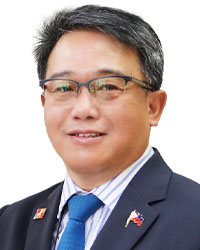The Philippines has shown its influence in advocating for intellectual property laws. Asia Business Law Journal sat down with Rowel Barba, director general of the Intellectual Property Office of the Philippines (IPOPHL) and the elected chair of the 21 member countries of the Asia-Pacific Economic Co-operation’s (APEC) Intellectual Property Rights Experts Group (IPEG). In this exclusive interview, he shares his vision and sheds light on the state of IP in the region
Asia Business Law Journal: Amid the current slowdown in Asia, what are your strategies for the IPEG to help stimulate the economy?
Rowel Barba: The pandemic has disrupted the world economy but, according to data from the World Intellectual Property Organisation, IP filings worldwide were not affected in the past two years. Most applications [came] from Asia, particularly China, Japan and South Korea. While the IPOPHL [was] affected by the pandemic in 2020, where our filings decreased by around 20% compared to 2019, we’re happy that we were able to recover in 2021. In 2022, IP filings increased by 3.7% to 48,259 filings from 46,558 applications in the previous year. Hopefully, we’ll be able to maintain and even increase the filings this year and in succeeding years.

Director General
Intellectual Property Office of the Philippines (IPOPHL)
We see IP as an important element in economic recovery, especially in helping our micro, small and medium-sized enterprises (MSMEs) and our creative sectors. They are the ones affected the most by the pandemic. Now co-operation is more needed after the pandemic, and we really need to help each other to harness the potential of IP for our inventors.
We are guided by the … APEC Putrajaya Vision, which is to have an open, dynamic, resilient and peaceful Asia-Pacific by 2040, where all people and succeeding generations will prosper and make use of IP effectively.
Our proposed work plan for the IPEG is anchored in three focus areas: IP financing; IP in the digital economy, and interconnectivity; and IP for sustainable and inclusive growth. We hope to work on these focus areas together with the other economies and to gather more input from academia, which we hope to implement during our term for the next two years until December 2024.
As the IPEG is one of the sub-fora under [APEC’s] Committee on Trade and Investments, we need to ensure we are aligned with the committee’s priorities. APEC is composed of developed and developing countries, so we hope that developed countries will be able to share their best practices.
ABLJ: The newly signed Regional Comprehensive Economic Partnership (RCEP) covers an extensive IP chapter that sets out a common protection and enforcement standard. What are the most unique features?
You must be a
subscribersubscribersubscribersubscriber
to read this content, please
subscribesubscribesubscribesubscribe
today.
For group subscribers, please click here to access.
Interested in group subscription? Please contact us.


























